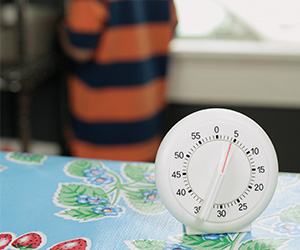Spanking, smacking or a hiding – whatever you call it, this form of punishment creates heated debate. Ciska Thurman talks to parents, checks in with the law and calls on an expert for advice
 ‘I spank my children – if they deserve it,’ says Pieter, father to Eben, 12, and Elizabeth, 10. ‘It’s not a regular occurrence. It is reserved only for the serious or life-threatening transgressions.
‘I spank my children – if they deserve it,’ says Pieter, father to Eben, 12, and Elizabeth, 10. ‘It’s not a regular occurrence. It is reserved only for the serious or life-threatening transgressions.
‘When my daughter was four, she stood on a chair and climbed over the pool fence to retrieve a toy. I needed to send a strong message about breaking the rules (she knew that entering the pool area without an adult was strictly forbidden). I explained what the consequences of her actions could have been and asked her to wait for me in her room. After a cooling-down period, I gave her a hiding.’ Pieter believes lashing out in anger is unacceptable, but that it is his right as a parent to chastise his children.
‘Violence begets violence,’ insists Sibusiso, mother to Vuyo, nine. ‘Think about the message hitting a child is sending; that in life, in order to settle a disagreement, you must use physical force to get your point across. A little whack on a kid’s hand as a deterrent is one thing, but administering a full-blown hiding – especially after some time has passed – is just confusing to the youngster. Sure, it sends a message, but it is the wrong message. A stint in a quiet corner with no toys or attention does wonders.’
What Sibusiso believes works best is giving rewards for good behaviour rather than sanctions for bad.
Who decides?
Since 2006, corporal punishment has been outlawed in South African schools. A new law is being drafted that will make it possible for parents using a flat hand on a child’s bottom as a form of discipline to be charged with assault.
But who gives the government the right to intervene in the way we choose to parent our kids? Or should it have the right, considering that we live in a country where three children are murdered every day? Legislating for what happens in people’s homes is notoriously difficult; for example, it’s illegal to beat your spouse, yet spouses are abused all the time.
Of course, preventing a hiding from developing into a full-blown beating is imperative, but how is it going to be enforced when many citizens don’t adhere to simple statutes like speed limits? On this point, Pieter and Sibusiso agree.
‘Taxes are better spent informing parents about active parenting – using various ways to teach and reprimand our kids,’ says Sibusiso. Pieter adds: ‘The state should rather concentrate on eliminating the conditions that are contributing to child abuse – poverty, crime, and the lack of basic services and education.’
The bottom line
Counsellor, educator and parent Dereck Jackson notes: ‘By far the major concern of parents is how to discipline effectively, while maintaining a good relationship with their children. If you get the discipline right, almost everything else falls into place.’
He believes that setting limits and establishing a relationship of mutual respect is key to effective parenting. He continues, ‘It provides the child with sensible boundaries within which to behave and relate to parents and to society. It gives them security through predictability.’
In Dereck’s book, Parenting with Panache, he refers to the three phases of effective discipline:
1. Establish the rules For example, stealing is never tolerated.
2. If the rule is broken, give an assertive, effective command ‘Don’t take your brother’s pen without asking.’ Use a clear, stern tone and keep eye contact.
3. If your child still doesn’t respond, take action immediately Remove the child from the situation and make them sit on their own for three minutes. After this timeout, discuss solutions to the problem.
Dereck says that the age of the child, the nature of the offence and your belief system should determine the appropriate action. One smack on the bottom – if danger is imminent (such as running across the road) – is acceptable. ‘The object of the smack is not to cause pain but to reinforce the message using the tactile sense through which a young child learns.’
Other discipline ideas
Use the ‘clap-growl’ technique Immediately following the undesirable behaviour, make a clear loud clap to get your toddler’s attention and then admonish in simple language (‘Don’t bite!’).
Illustrate the consequences of bad behaviour If you can’t get your little one to tidy up her room, remove and ‘re-home’ toys off the floor until she has little left to play with. For teenagers, positively reinforce and reward changed behaviour When your son comes home before his curfew, reward his sense of responsibility by allowing him an extra hour next time.







